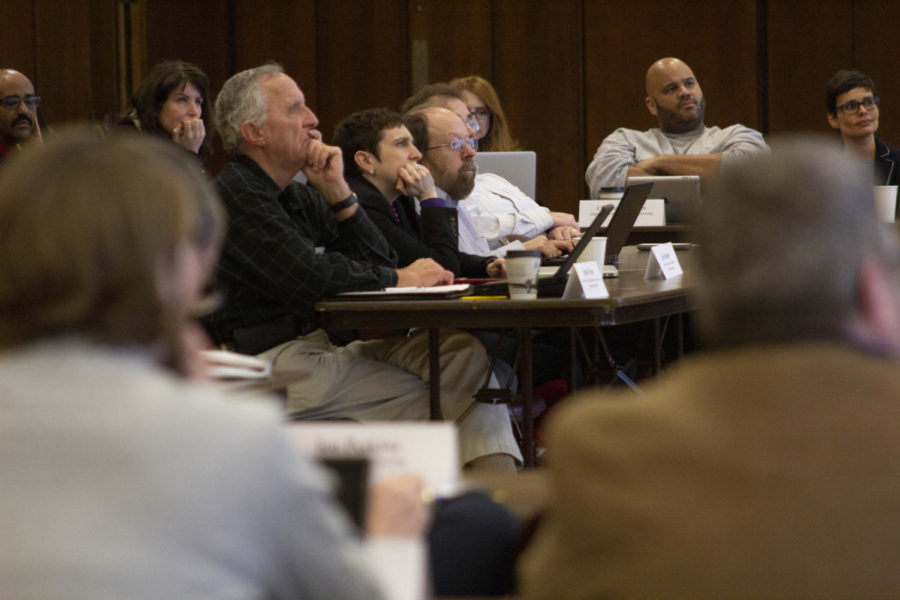Faculty Senate discusses WorkCyte, free speech bill
Kennedy DeRaedt/Iowa State Daily
Faculty Senate members listen to Paul Fuligni’s presentation on campus facilities. Fuligni, associate vice president for facilities, spoke on critical repairs for Iowa State buildings during the Faculty Senate meeting Jan. 22 in the Sun Room of the Memorial Union.
April 9, 2019
As the end of the spring term draws near, Faculty Senate is still at work with more improvements to Iowa State. This week’s meeting included updates on the WorkCyte/Workday transition, new majors and minors, renaming degrees and the free speech bill passed by the Iowa Legislature.
David Cantor, professor in supply chain and information systems; Jo Ann Powell-Coffman, professor in genetics development and cell biology; Heather Paris, associate vice president in university services; and Dwaine Heppler, associate vice president in university human resources, provided an update on the upgrade to WorkCyte/Workday. From the five faculty forums that were held in March, 428 faculty members attended the forums, which Cantor said was a good turnout.
Faculty members will begin training for WorkCyte/Workday on April 26; sign-ups are available at Learn@ISU. The majority of faculty will complete computer-based training, and there will be job aids available to assist those who need help.
“I think the responses with the technology are overwhelmingly positive,” said Powell-Coffman.
Paris said that there will be another forum from noon to 2 p.m. April 16 that will be specifically targeted to principal investigators, lead researchers and faculty who have a lot of research work. There will be a question-and-answer section and one-on-one break out sessions where specific questions about the grant process can be answered.
At Tuesday’s meeting, President of the Faculty Senate Peter Martin addressed the free speech bill that passed in the Iowa Legislature.
“At first sight, this bill is somewhat peculiar,” Martin said. “Universities, and Iowa State is no exception, have always supported free speech. It is the trademark of what we do in scholarship, in teaching and in outreach… Free speech is protected, and we support free speech here at Iowa State.”
Martin said that there is a difference between free speech and incivility, intolerance, offensive speech and harassing behavior.
“We should not tolerate or keep quiet when we hear offensive speech… speech that restricts or discriminates against any group of students, faculty or staff here on campus,” Martin said.
Faculty senators received forms for nominating to elect chairs for two councils: the Faculty Development and Administrative Relations Council and the Judiciary and Appeals Chair. The election results will be announced at the next Faculty Senate meeting, April 23.
The Senate voted on passing an addition of a major and minor in business analytics. There was a unanimous vote to pass both the major and the minor in the Faculty Senate.
Faculty Senate also unanimously voted to approve the name changes of the master of science in information assurance and the master of engineering in information assurance to a master of science and master of engineering in cyber security. The name changes were proposed and approved to create more contemporary reflections of what the majors offer.
A master’s in athletic training was also proposed at the Faculty Senate meeting. This program would provide students with graduate-level coursework and better prepare those who are looking to have a career in that field.
Brett Sponseller, associate professor in veterinary microbiology and preventative medicine, proposed a revision to faculty handbook chapter 10.5, the policy on classroom disruption.
According to the proposal document, “In the past several years, the Dean of Students Office has seen a notable increase in the number of faculty consultations on dealing with disruption in the classroom environment. Recent national incidents of violence in school settings have only heightened faculty concern about incidents of disruption and disruptive conduct in the learning environment, and the availability of policy, processes, and tools for addressing them.”

















